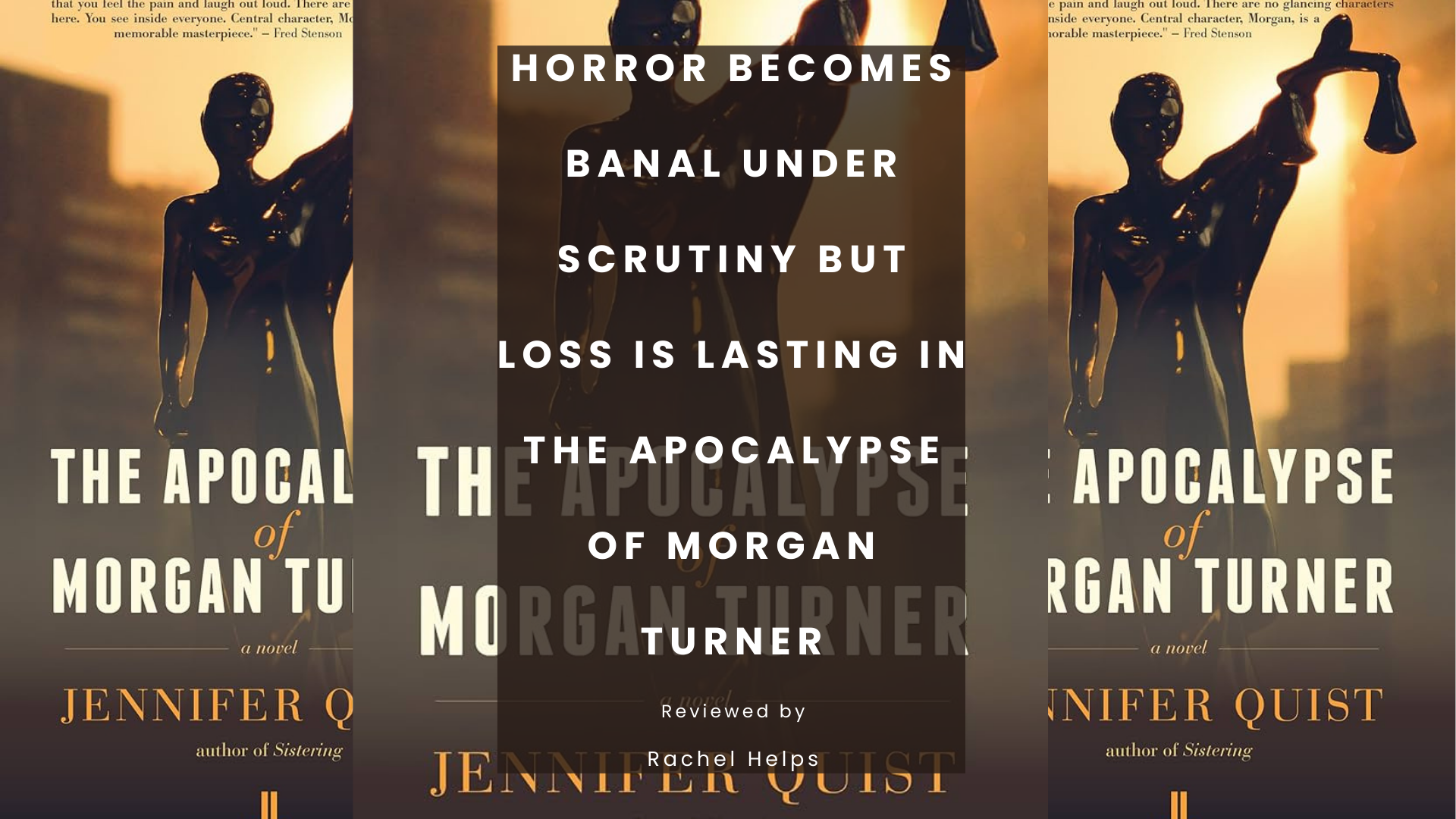Articles/Essays – Volume 51, No. 2
Horror Becomes Banal Under Scrutiny but Loss is Lasting in The Apocalypse of Morgan Turner | Jennifer Quist, The Apocalypse of Morgan Turner
Although courtroom dramas can be entertaining, providing a formula for introducing new information through surprise witnesses or new evidence, simple procedurals can grow tired. An antidote is a realistic courtroom novel, where inner change and contemplation outshine lawyerly details. Jennifer Quist’s The Apocalypse of Morgan Turner is a short but carefully crafted literary novel that gives readers a view into the impact continual court appearances can have on a victim’s family. Characters in the book contemplate the origin of evil and mental illness, as well as friendship and self-expression.
The central character is Morgan Turner, whose sister Tricia has been murdered by her boyfriend. The Canadian government has appointed Joshua Lund as the prosecuting attorney. Through Joshua, she meets his sister Gillian, a graduate student in literature, and their mentally ill brother Paul, all former Mormon missionaries.
Morgan wants to understand madness and horror in order to understand Tricia’s murder. She becomes interested in exorcisms and wants to perform one. While watching pigs walk into the slaughterhouse, Paul tells her about how Jesus cast devils into pigs. He says that Jesus doesn’t have to use any special words—he simply commands the devils and they obey him. The way the pigs march into the slaughterhouse without “squealing panic” is a metaphor for the way evil plays out in the novel. Morgan may want to purify her life of evil, but it is everywhere. As Gillian states, “We’ve all got some natural, selfish badness in us. It’s in the dirt we’re made of—it’s the stuff that makes us grow. But then there’s evil outside of us, gnawing away at the good things we’re made of.”
Quist’s prose is intimate, laced with dry humor. She uses original ways to describe characters, employing small details to humanize them. Morgan has one friend whose text exchanges are “variations on intricate emojis drawn with punctuation marks” (135). Morgan’s brother Tod is the kind of person who goes to work early to read philosophy in his car. Quist’s asides are matter-of-fact: “most of the time, all blood means to a girl is that everything is exactly as it should be” (87).
The Mormons in this book feel like outsiders. They are very human, and try hard to do good things, but they don’t really help Morgan through her apocalypse. Josh works to achieve a harsher prison sentence for Tricia’s murderer, but it doesn’t help Morgan mourn Tricia’s death. Gillian reminds me of myself. I see my own sporadic, aggressive, and formulaic friendship overtures in the way Gillian takes Morgan under her wing. She has my same smug way of explaining minutiae—minutiae that matter less than the people surrounding them. I feel giddy when I read that her thesis topic is looking at legal transcripts as “incidental found literature,” and I feel kind of robbed that I didn’t get to read any of it. She seems more interested in Morgan because of her connection to the murder case, rather than in her as a person. Their friendship is an unequal one where Gillian is constantly trying to help Morgan, but the material support—taking her to the hospital, giving her rides, buying her a juice—are insufficient to soothe Morgan’s psychological discontent. Yet Gillian’s eye for detail and unfailing check-ups on her brother Paul are a large part of what allows him to live on his own. That kind of service has value, because some people are unable or unwilling to take care of themselves.
In contrast to Gillian, her brother Paul grew up Mormon, but no longer believes. His mental illness humbles him, and he cooperates when Morgan asks him to accompany her in several of her revelatory moments. Morgan herself wonders at how she can befriend a mentally ill man when mental illness might have played a role in her sister’s murder; since their relationship is not romantic she feels she is safe from passionate murder. He doesn’t have answers for Morgan but offers his thoughts to her as an intellectual equal.
Morgan starts the book wondering if it’s possible for a body to be negatively identified—by the end of the book she imagines that others “negatively identify” her as Tricia’s sister—the one who isn’t dead. Part of Morgan’s identity is in not being Tricia; her sister’s death requires Morgan to define herself independently.
After Morgan begins working in a cafeteria with Chinese coworkers, she starts learning Chinese words and phrases. Her coworkers are friendly in subtle ways, like when they choose to watch Korean dramas with English as well as Chinese subtitles for Morgan’s benefit. Learning Chinese helps Morgan move on. Usually Morgan’s dialogue is conveyed indirectly. In one of the few times she speaks “out loud”, it is loudly and in Chinese. In the end of the book, Morgan starts a new life as an English instructor in China. Perhaps English was so loaded with old thought patterns and memories that Morgan had to start thinking in a different language to start anew. Away from the sphere of influence of Tricia’s murder, she can be “positively” identified as Morgan.
Jennifer Quist. The Apocalypse of Morgan Turner. Berkeley, Calif.: Linda Leith Publishing, 2018. 300pp. Paper: $18.95. ISBN: 9781988130620.


 Back to full Issue
Back to full Issue

